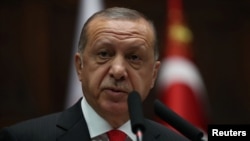Turkey will next week lift the state of emergency introduced after a failed 2016 coup and which granted President Recep Tayyip Erdogan's government greater powers to detain suspects, his spokesman said on Friday.
The announcement comes after Erdogan chaired the first cabinet meeting since he won elections last month endowing him with sweeping new powers, and pressing economic challenges topping the agenda.
"The current state of emergency is coming to an end on the night of July 18. Mr President has the will... not to extend it," presidential spokesman Ibrahim Kalin told reporters after the meeting in Ankara.
Under emergency rule, renewed seven times since the abortive coup against Erdogan's elected government, over 110,000 public sector employees have been removed from their jobs while tens of thousands more have been suspended in a crackdown criticized by Ankara's Western allies.
Amnesty International in April said freedom of expression and the right to a fair trial had been "decimated" under the state of emergency introduced five days after the attempted putsch on July 15, 2016.
More than 1,300 associations and foundations have been shut down under the measures.
However the government says the purges are needed to rid the state of the "virus" of Muslim preacher Fethullah Gulen blamed by the authorities for masterminding the coup bid.
Gulen, who is based in the US, has denied any role and insists his movement promotes peace.
Economy tops cabinet talks
Kalin added that the lifting of emergency rule would not slow down Turkey's fight against terror, and that the fight would continue "in a determined fashion" under counter-terrorism laws.
But he said that if Turkey faces another "extraordinary threat, the state of emergency might be reintroduced".
In his election campaign, Erdogan promised not to prolong the emergency rule.
The strongman was sworn in for a second presidential term on Monday under the new system that grants the head of state executive powers while abolishing the post of prime minister.
Erdogan vowed to "work tirelessly to build a Turkey that can look to the future with confidence", at a ceremony in the former parliament shortly before the cabinet meeting at his vast presidential palace.
He hailed the transition as a "new beginning" in the country's history but opponents denounced it as a drift toward one-man rule.
Erdogan this week unveiled the new cabinet, giving his son-in-law Berat Albayrak, 40, the crucial post of finance minister.
Albayrak's rapid promotion from the energy ministry took traders by surprise as market-friendly faces like outgoing deputy premier Mehmet Simsek were not present in the new cabinet.
In an apparent sign that the economy is an urgent issue for the government, Albayrak said: "We have determined some steps to be taken in line with macro-economic objectives," in a message on Twitter.
Albayrak said his economic policy would be guided by "budget discipline, a single digit inflation rate and structural reforms."
Financial markets are skeptical about Albayrak's appointment which prompted a new battering for the Turkish currency and assets.
Kalin said a medium term economic program would be presented to Erdogan in the coming weeks.




